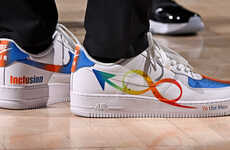
Radio Hosts Accuse Magic Johnson of Faking AIDS
Jeremy Gutsche — October 11, 2008 — Top Lists
References: cbs13
Two Minneapolis talk show hosts have sparked controversy by accusing Magic Johnson of faking AIDS. The newscasters, KTLK’s Chris Baker and Langdon Perry, were talking about how long people can live after being diagnosed with drugs.
Talking about treatable diseases, Perry noted, “...like Magic with his faked AIDS. Magic faked AIDS.”
Baker questioned, “You think Magic faked AIDS for sympathy?”
“I’m convinced that Magic faked AIDS.”
“Me too,” Baker replied.
The situation has outraged Magic Johnson who released a statement that he was “outraged that Chris Baker and Langdon Perry would minimize such a serious and deadly issue.”
This isn’t the first time journalists have pushed the envelope for publicity, but what is the cost? In our viral world, shock is increasingly used as a tool for publicity, but situations like this aren’t cool.
Magic Johnson left the NBA in 1991 when he was diagnosed with AIDS, and continues to be a symbol of survival and hope to those with the disease.
Talking about treatable diseases, Perry noted, “...like Magic with his faked AIDS. Magic faked AIDS.”
Baker questioned, “You think Magic faked AIDS for sympathy?”
“I’m convinced that Magic faked AIDS.”
“Me too,” Baker replied.
The situation has outraged Magic Johnson who released a statement that he was “outraged that Chris Baker and Langdon Perry would minimize such a serious and deadly issue.”
This isn’t the first time journalists have pushed the envelope for publicity, but what is the cost? In our viral world, shock is increasingly used as a tool for publicity, but situations like this aren’t cool.
Magic Johnson left the NBA in 1991 when he was diagnosed with AIDS, and continues to be a symbol of survival and hope to those with the disease.
Trend Themes
1. Harmful Journalism - There is an opportunity for media companies to invest in technology that can detect and flag harmful and false content.
2. Viral Outrage - Businesses can capitalize on viral outrage by quickly responding and taking action to address the underlying issue.
3. Social Responsibility - Companies can differentiate themselves by taking a strong stance on social responsibility, including ethics in journalism and media.
Industry Implications
1. Media - The media industry can use new tools and technology to monitor content, while incorporating ethical standards into its business practices.
2. Public Relations - PR agencies can help businesses navigate viral outrage by developing crisis response plans, executing swift action, and communicating transparently with the public.
3. Non-profit/healthcare - Non-profits and healthcare organizations can leverage the power of symbols and ambassadors (like Magic Johnson) to raise awareness and funds for important causes.
1.7
Score
Popularity
Activity
Freshness























